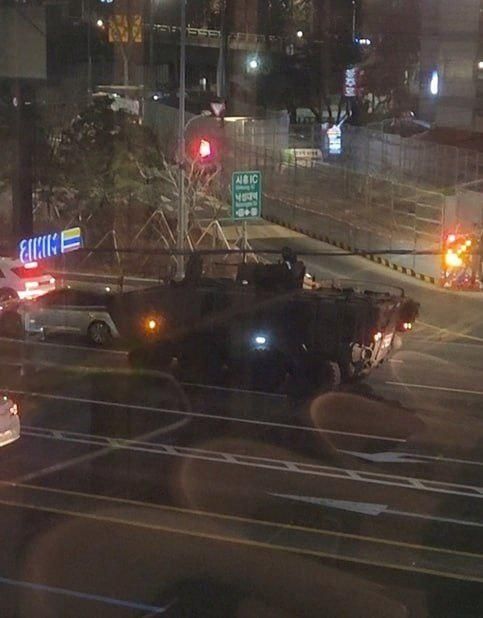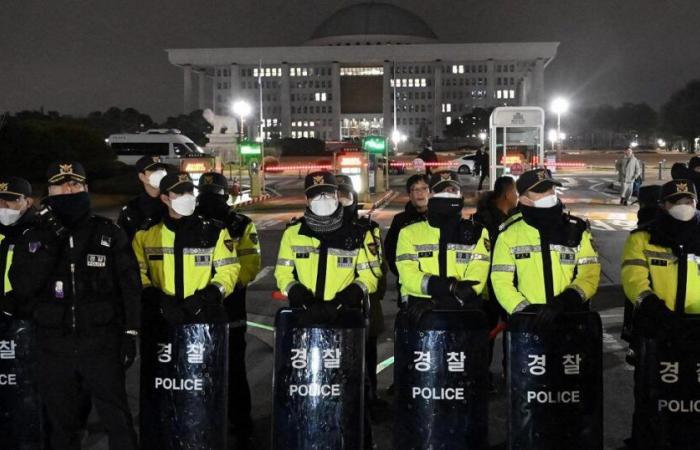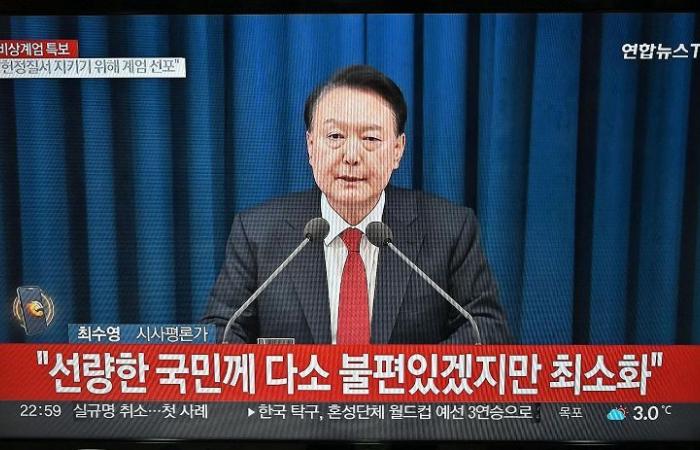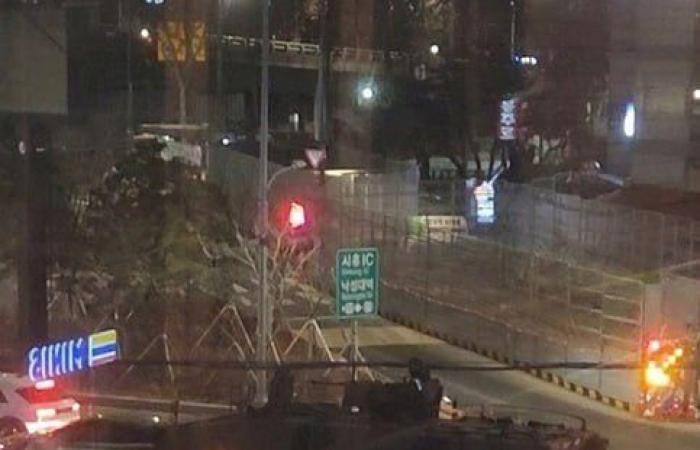High tension in South Korea after the South Korean president Yoon Suk Yeol he declared emergency martial lawinvoking it as a “necessary measure to protect the country from the communist forces of North Korea”.
The measure was cancelled unanimously after the vote of the National Assemblywhich occurred in a daring manner. To prevent this they had been made to land helicopters on the roof of the Parliament South Korea, into which the troops of the military command created after the declaration of martial law had entered.
The situation remains tense also because, according to the local news agency YTN, some senior South Korean soldiers have declared that martial law will remain in force until President Yoon Suk Yeol personally lifts it, despite the majority of parliament voting against it.
Here is a reconstruction of what happened.
President Yoon’s speech live on TV
In a speech broadcast live on television to the nation, the president of the South Korea declares emergency martial law. The head of state, Yoon Suk Yeolstates that the measure is necessary to protect the country from “communist forces”. “To safeguard a liberal South Korea from threats posed by North Korea’s communist forces and to eliminate anti-state elements… I hereby declare emergency martial law,” he said.
The meeting of the “commanders”
After the president’s decision, who cited the need “to eradicate pro-North Korean forces and support the constitutional order” in justifying it, the South Korean Defense Minister provides “a commanders’ meeting” of the armed forces, “asking for a greater vigilance” and ordering the army “to stay in a state of guard emergency”.
Helicopters land on Parliament, political and parliamentary activities banned. Hundreds in front of the building
Live TV shows some helicopters landing on the roof of Parliament South Korean. Army Chief of Staff General Park An-su is appointed martial law commander. Among the first measures arranged, the mass banning parliamentary activities and political parties.
The military command announces a decree banning all political activities, Parliament evenas well as protests and political party activities.
The decree issued by General Park An-su comes into force at 11.00 pm (3.00 pm in Italy) and it also puts all media and publishers under scrutinyas well as ordering striking trainee doctors to immediately return to work within 48 hours. Everyone those who violate martial law, “may be arrested or searched without a warrant“, based on the decree.
Hundreds of people gather in front of Parliament to protest the imposition of martial law, as shown on live TV.
“Open the gate, please. Your job is to protect the National Assembly. Why do you stand there and watch MPs get trampled?”, shouts a middle-aged man at a group of policemen guarding the gate.
Shortly before, iopposition leader Lee Jae-myung he had called on people to gather in front of the Assembly to protest, denouncing the new martial law as “illegal”.
Clashes at the entrance to Parliament, soldiers inside the building
Woo Won-shik, speaker of the National Assembly, calls on all deputies to gather in the main chamber of the assembly to discuss how to respond to the declaration of martial law. But live videos show police and soldiers blocking access to Parliament.
Indeed, Parliament has the power by a simple majority vote, to abolish martial law and the majority is from the Democratic Party, in opposition, which has 170 of the 300 seats in the single-chamber institution.
In front of the building there are clashes between protesters and the police deployed to prevent access.
South Korean opposition leader Lee Jae-Myung films himself in an Instagram live broadcast climbing over the fence to enter parliament, shortly after the proclamation of martial law.
“President Yoon Suk-yeol declared martial law for no reason, putting the country in the hands of the military – Lee denounced in the live broadcast – They can’t let it pass, tanks, armored vehicles and soldiers with guns and knives will soon control the country “. “From this moment on, Yoon is no longer the president of the Republic of Korea,” Lee concluded.
During a night session of the National Assembly, a resolution is adopted calling for the lifting of the martial law declared in South Korea. In the end, 190 out of 300 deputies are present and all vote in favor of the lifting.
By law, President Yoon must comply without delay.
The troops leave the building, but the South Korean army declares that it will “enforce martial law until it is lifted by the president”, according to local TV reports.
South Korea: protest outside the National Assembly headquarters in Seoul, following President Yoon Suk Yeol’s announcement of martial law, December 3, 2024 (Afp)
What’s behind Yoon’s proclamation of martial law
Yoon’s surprise move, late in the evening, took place while in Parliament the People Power Partyin power in Seoul, and the main opposition force, the Democratic Partythey continue to argue extremely harshly on the budget proposal for 2025: a tense clash but not to the point of allowing one to imagine a draconian move like martial law, which harks back to past decades and the dark period of the long military dictatorship.
South Korean President Yoon Suk Yeol proclaims emergency martial law, Seoul, December 3, 2024 (Afp)
The majority and opposition therefore united in condemning the law. Han Dong-hoon, the head of the People Power Partyhe defined “wrong” the move and assured that he will “block it” with the support of the people, according to a note released shortly by Yoon’s TV message. In the same vein, the response of Democratic Partywhich he talked about “unconstitutional” action”, calling for an emergency convocation of the National Assembly, Seoul’s parliament.
In response, the president accused the opposition of activities “against the State”. In his unexpected evening TV message to the nation, Yoon said the emergency martial law was a necessary step during parliamentary wrangling over a budget proposal. “Without regard for the people’s livelihood, the opposition party has paralyzed the government just for the sake of impeachment, special investigations and to protect their leader from justice,” Yoon added.
The won, the local currency, collapses
The South Korean currency collapsed against the dollar after the surprise declaration of martial law: the won slipped to 1,430 against the greenback in overnight trading, at the lowest levels since October 2022 of 1,432.4. In onshore trade, the Seoul currency closed at 1,402.9 at 3.30 pm local time, down 1.6%.

South Korean armed forces enter parliament in Seoul (X)
USA: “We monitor the situation”
The US declarednoted that they are “closely monitoring the situation” in South Koreaclosely allied with Washington. The U.S. government “is in contact with the government of the Republic of Korea and is closely monitoring the situation,” a White House National Security Council spokesperson said in a statement.
Deputy Secretary of State Kurt Campbell, speaking at a State Department event, said: “We have every hope and expectation that any political dispute in South Korea will be resolved peacefully and in accordance with the rule of law.”
Kremlin: “Worrying decision”
The Kremlin has called the situation in South Korea “alarming” after the declaration of martial law and is closely monitoring developments, Russian President Dmitry Peskov’s spokesman said. “The situation is alarming. We are watching closely,” Peskov said. Interfax reports it.
Farnesina urges caution
“President Yoon declared martial law on December 3, 2024. Political activities and gatherings are thus prohibited. Clashes between the army and protesters have been recorded in the Parliament area. Possible disruptions to the internet connection are reported. Our compatriots are advised of the utmost be careful when traveling, avoid gatherings and demonstrations and follow the instructions of the local authorities”. The Ministry of Foreign Affairs’ ‘Safe travel’ website writes this for South Korea.
For emergencies, the Italian Embassy in Seoul can be reached at +821022420491.
“South Korea is one of our allies and moves in a complicated context in the Indo-Pacific region, with an increasingly aggressive North Korea: we have sent clear political messages to Pyongyang not to attempt to take advantage of a situation of political conflict anywhere “inside the South Korean Parliament”, Italian Foreign Minister Antonio Tajani told NATO.








